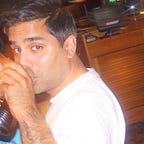A Hidden Humanitarian Crisis
As we watch in horror as an immense refugee crisis unfolds in Ukraine, this seems like an apt time to remind ourselves of the often untold plight of undocumented migrants around the world. Their reality betrays even the most basic pretensions of care, respect and kinship that we like to believe are the tenets of a civilised society.
These are the invisible: the unseen, the uncared for, the illegal. Their status is determined by paperwork, their fate administered by bureaucrats. The NGO I visited and volunteered with in Paris have asked me not to name them in this article so that they do not attract the attention of French authorities: they too are disregarded, for providing a basic healthcare service that is not deemed necessary for a problem that does not exist.
And yet on one day in a little over 3 hours, 51 people were seen. A great many with issues caused by poor hygiene from homeless living conditions, predominantly skin rashes and dental problems. Some presented with more severe skin issues left untreated and exposed. While we may obsess over the aesthetics of clarity and brightness, it’s easy to forget the primary purpose of skin is to act as a protective barrier from harmful bacteria and viruses. To see how easily skin can disintegrate, and to witness the damage caused by that exposure, is to be reminded both of our fragility and our vanity.
Despite the limitations of the service provided, from a table in the middle of a busy street on which sit bags of donated medicines, every refugee is grateful to be treated. The organisation is unable to issue prescriptions, and can only signpost to the few clinics scattered around Paris where they could be seen for more serious conditions. It became clear to me that beyond medical treatment though, it is kindness and attention that is most gravely absent from their lives, and it’s remarkable how effective an antidote that visibly proved to be, if only temporarily.
That is undeniably a credit to the medical volunteers who see patients. Christelle Blunden, a GP from Southampton who I travelled with, described her motivation: “volunteering is a way to offer a friendly point of contact for people who’ve endured and continue to endure endless hostility and disadvantage. The level of need is overwhelming and puts many things into perspective, but I derive some satisfaction from being able to help in some small way, rather than letting that overwhelm lead to inaction”.
Overcoming, and enduring that visceral sense of futility is just one of the challenges faced by the group. Volunteers fund themselves — their travel, accommodation and time away from work. Without question it represents a great sacrifice, not only financially but with it a considerable emotional burden. In the light of the perilous struggle that undocumented refugees face though; fleeing persecution, war, and famine only to meet hostility and destitution, it becomes an eminently justifiable sacrifice to make.
These are people whose makeshift homes under bridges and in squats without running water are routinely cleared by French police. Their very existence is met with disdain and intolerance in the country where they seek sanctuary. Their reality is a fraught one, constantly watchful of authorities who would return them to horrific situations. More horrific still than the conditions in which they find themselves.
It is almost impossible to conceive of a situation so desperate in a country as developed as France — in a city as affluent as Paris — that NGOs are critically needed to fill the cavernous gaps in basic healthcare provision, but this is the tragic, unyielding reality. It is an inconvenient truth that prevails unfathomably close.
If you would like to donate to ensure this essential service to the most vulnerable is able to continue or if you know of any medical professionals willing to volunteer, please contact me at manthanpathak@protonmail.com.
